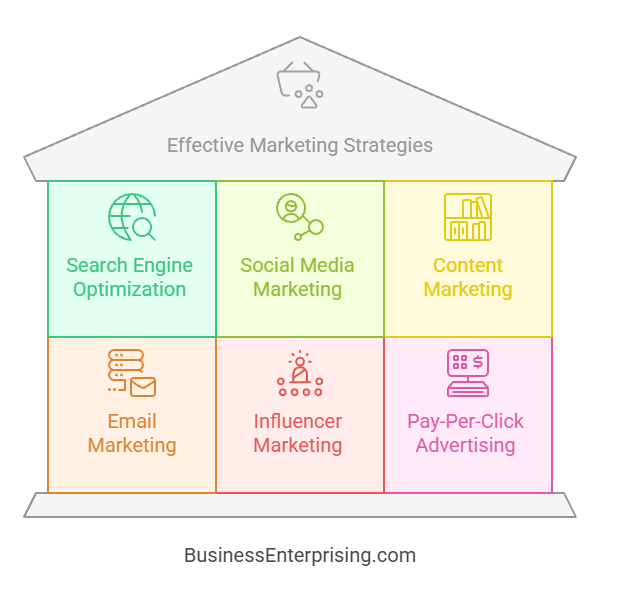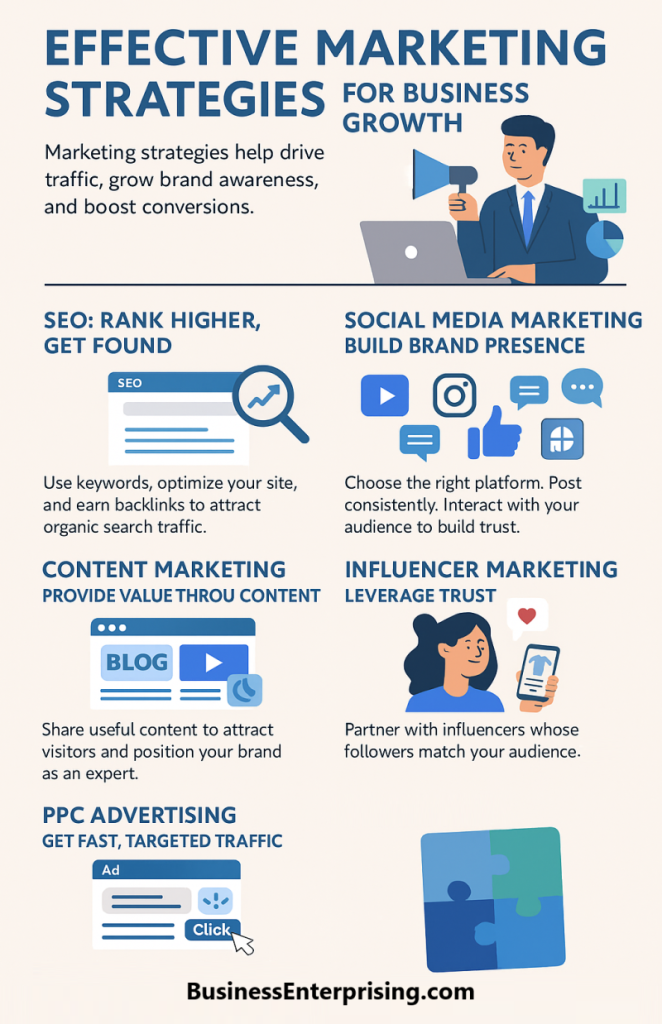 In the fast-paced and ever-evolving business landscape, effective marketing strategies are crucial for achieving growth and sustaining a competitive edge. A well-crafted marketing strategy can help businesses reach their target audience, build brand awareness, and drive conversions. Let’s explore some of the most effective marketing strategies, including SEO, social media marketing, content marketing, etc.
In the fast-paced and ever-evolving business landscape, effective marketing strategies are crucial for achieving growth and sustaining a competitive edge. A well-crafted marketing strategy can help businesses reach their target audience, build brand awareness, and drive conversions. Let’s explore some of the most effective marketing strategies, including SEO, social media marketing, content marketing, etc.
Search Engine Optimization (SEO)
Search Engine Optimization (SEO) is one of the most powerful marketing strategies for businesses. It helps to enhance online visibility and attract organic traffic. By optimizing their websites for search engines, businesses can improve their rankings on search engine results pages (SERPs). This makes it easier for potential customers to find them. SEO involves several components, including keyword research, on-page optimization, and link building.
Keyword research is the foundation of any successful SEO strategy. Identifying relevant keywords that potential customers use when searching for products or services enables businesses to tailor their content accordingly. Additionally, on-page optimization focuses on improving various elements of a website. Such elements include title tags, meta descriptions, and header tags. Doing so ensures that search engines can easily understand and index the content.
Link building, another critical aspect of SEO, involves acquiring high-quality backlinks from authoritative websites. These backlinks signal to search engines that the content is valuable and trustworthy, helping to improve rankings. Furthermore, creating high-quality, engaging content that addresses the needs and interests of the target audience can attract natural backlinks and drive organic traffic.
Social Media Marketing
Social media marketing has also become an indispensable tool for businesses aiming to connect with their audience, build brand awareness, and foster customer engagement. With billions of users on these platforms, social media offers unparalleled opportunities for reaching a broad and diverse audience. Effective social media marketing involves creating and sharing content that resonates with the target audience, encourages interaction, and promotes brand loyalty.
Developing a strong social media presence begins with selecting the right platforms. Each platform has its unique demographics and user behavior, so businesses should choose those that align with their target audience. For instance, Instagram is ideal for visually-driven content and younger audiences, while LinkedIn is better suited for B2B marketing and professional networking.
Consistency is key in social media marketing. Regularly posting engaging content, such as images, videos, and articles, keeps the audience interested and encourages ongoing interaction. Additionally, leveraging features like live streaming, stories, and polls can create dynamic and interactive experiences for followers. Engaging with the audience by responding to comments, messages, and reviews fosters a sense of community and strengthens the brand-customer relationship.
Content Marketing and Blogging
Content marketing and blogging are essential strategies for attracting and retaining customers by providing valuable and relevant content. By creating and distributing high-quality content, businesses can position themselves as thought leaders and trusted sources of information in their industry. Effective content marketing involves understanding the target audience’s needs and preferences and delivering content that addresses their pain points and interests.
Blogging is a fundamental component of content marketing. Regularly publishing blog posts on topics related to the business’s products or services can drive organic traffic, improve SEO rankings, and establish the brand’s authority. Additionally, blogs provide an opportunity to showcase the business’s expertise, share insights, and offer solutions to common problems faced by customers.
Diversifying content formats is also crucial for a successful content marketing strategy. In addition to blog posts, businesses should consider creating videos, infographics, podcasts, and eBooks to cater to different audience preferences. Promoting content across various channels, such as social media, email newsletters, and industry forums, can increase its reach and impact.
Email Marketing
Email marketing remains one of the most effective marketing strategies for businesses. By building and maintaining a targeted email list, businesses can communicate directly with their audience, promote products or services, and nurture customer relationships. Effective email marketing involves segmenting the audience based on their interests and behaviors and delivering personalized and relevant content.
Creating compelling email campaigns begins with crafting attention-grabbing subject lines and engaging content. Personalization is key to increasing open and click-through rates. Addressing recipients by name, tailoring content to their preferences, and providing exclusive offers can enhance the email’s effectiveness. Additionally, including clear calls-to-action (CTAs) encourages recipients to take the desired action, whether it’s making a purchase, signing up for a webinar, or downloading a resource.
Automated email marketing is another powerful tool for enhancing efficiency and effectiveness. By setting up automated workflows, businesses can send targeted emails based on specific triggers, such as welcome emails for new subscribers, abandoned cart reminders, and post-purchase follow-ups. This automation ensures timely and relevant communication, helping to build and maintain strong customer relationships.
Influencer Marketing
Influencer marketing leverages the reach and credibility of influential individuals to promote products or services. By partnering with influencers who align with the brand’s values and target audience, businesses can tap into their followers’ trust and loyalty. Influencers can create authentic content that showcases the brand’s offerings and encourages their audience to take action.
Identifying the right influencers is crucial for a successful influencer marketing campaign. Businesses should look for influencers who have a genuine connection with their audience and whose values align with the brand. Collaborating with influencers on content creation, such as product reviews, tutorials, and sponsored posts, can generate buzz and drive engagement.
Measuring the effectiveness of influencer marketing involves tracking key performance indicators (KPIs), such as engagement rates, click-through rates, and conversions. Analyzing these metrics helps businesses understand the campaign’s impact and make data-driven decisions for future collaborations.
Pay-Per-Click (PPC) Advertising
Pay-Per-Click (PPC) advertising is a highly effective strategy for driving targeted traffic to a business’s website. By bidding on relevant keywords, businesses can display their ads on search engines and other platforms, paying only when users click on the ad. PPC advertising allows for precise targeting, immediate visibility, and measurable results.
Creating successful PPC campaigns begins with thorough keyword research. Identifying high-intent keywords that potential customers are likely to use ensures that the ads reach the right audience. Crafting compelling ad copy and using eye-catching visuals can increase click-through rates and drive conversions.
Optimizing landing pages is also critical for maximizing the effectiveness of PPC campaigns. The landing page should align with the ad’s message, provide clear and concise information, and include strong calls-to-action. Additionally, regularly monitoring and adjusting the campaign based on performance data can help improve results and return on investment (ROI).
Conclusion
In conclusion, businesses can achieve significant growth and success by implementing effective marketing strategies tailored to their goals and target audience. SEO, social media marketing, content marketing, email marketing, influencer marketing, and PPC advertising are powerful tools that, when used strategically, can drive traffic, engagement, and conversions. Understanding the unique benefits and best practices of each strategy allows businesses to create a comprehensive marketing plan that maximizes their reach and impact.
By staying attuned to market trends, continuously analyzing performance data, and adapting their strategies, businesses can remain competitive and responsive to the evolving needs of their audience. Ultimately, a well-executed marketing strategy not only enhances visibility and profitability but also fosters strong and lasting relationships with customers.


